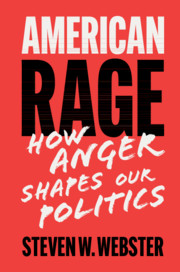Crossref Citations
This Book has been
cited by the following publications. This list is generated based on data provided by Crossref.
Leonard, Naomi Ehrich
Lipsitz, Keena
Bizyaeva, Anastasia
Franci, Alessio
and
Lelkes, Yphtach
2021.
The nonlinear feedback dynamics of asymmetric political polarization.
Proceedings of the National Academy of Sciences,
Vol. 118,
Issue. 50,
von Scheve, Christian
2021.
Comment: Emotions as Relational Orientations: Accounting for Culture and Social Structure.
Emotion Review,
Vol. 13,
Issue. 2,
p.
94.
Kydd, Andrew H.
2021.
Decline, radicalization and the attack on the US Capitol.
Violence: An International Journal,
Vol. 2,
Issue. 1,
p.
3.
Konisky, David M
and
Nolette, Paul
2021.
The State of American Federalism, 2020–2021: Deepening Partisanship amid Tumultuous Times.
Publius: The Journal of Federalism,
Vol. 51,
Issue. 3,
p.
327.
Brown, Heath
and
Cormack, Lindsey
2021.
Angry about Fraud: How Congress Took up Trump’s Claims of Fraud.
The Forum,
Vol. 19,
Issue. 1,
p.
77.
Gomez, Ricardo
2021.
The failed promise of IeCT for development: Aunt Ofelia replies to her letter 20 years later.
THE ELECTRONIC JOURNAL OF INFORMATION SYSTEMS IN DEVELOPING COUNTRIES,
Vol. 87,
Issue. 1,
van Zomeren, Martijn
2021.
Toward an Integrative Perspective on Distinct Positive Emotions for Political Action: Analyzing, Comparing, Evaluating, and Synthesizing Three Theoretical Perspectives.
Political Psychology,
Vol. 42,
Issue. S1,
p.
173.
Lelkes, Yphtach
2021.
What Do We Mean by Negative Partisanship?.
The Forum,
Vol. 19,
Issue. 3,
p.
481.
Webster, Steven W.
2021.
The Role of Political Elites in Eliciting Mass-Level Political Anger.
The Forum,
Vol. 19,
Issue. 3,
p.
415.
Webster, Steven W.
and
Albertson, Bethany
2022.
Emotion and Politics: Noncognitive Psychological Biases in Public Opinion.
Annual Review of Political Science,
Vol. 25,
Issue. 1,
p.
401.
Capelos, Tereza
Salmela, Mikko
and
Krisciunaite, Gabija
2022.
Grievance Politics: An Empirical Analysis of Anger Through the Emotional Mechanism of Ressentiment.
Politics and Governance,
Vol. 10,
Issue. 4,
p.
384.
Wolak, Jennifer
and
Sokhey, Anand Edward
2022.
Enraged and Engaged? Emotions as Motives for Discussing Politics.
American Politics Research,
Vol. 50,
Issue. 2,
p.
186.
2022.
Democratic Isolation, Thin Citizenship, and Insurrection: A Theory.
eJournal of Public Affairs,
Vol. 11,
Issue. 1,
Reuning, Kevin
Whitesell, Anne
and
Hannah, A. Lee
2022.
Facebook algorithm changes may have amplified local republican parties.
Research & Politics,
Vol. 9,
Issue. 2,
Green, Jon
Hobbs, William
McCabe, Stefan
and
Lazer, David
2022.
Online engagement with 2020 election misinformation and turnout in the 2021 Georgia runoff election.
Proceedings of the National Academy of Sciences,
Vol. 119,
Issue. 34,
Lee, Amber Hye-Yon
Lelkes, Yphtach
Hawkins, Carlee B.
and
Theodoridis, Alexander G.
2022.
Negative partisanship is not more prevalent than positive partisanship.
Nature Human Behaviour,
Vol. 6,
Issue. 7,
p.
951.
Krupnikov, Yanna
and
Ryan, John Barry
2022.
The Other Divide.
Stapleton, Carey E.
and
Dawkins, Ryan
2022.
Catching My Anger: How Political Elites Create Angrier Citizens.
Political Research Quarterly,
Vol. 75,
Issue. 3,
p.
754.
Webster, Steven W.
Connors, Elizabeth C.
and
Sinclair, Betsy
2022.
The Social Consequences of Political Anger.
The Journal of Politics,
Vol. 84,
Issue. 3,
p.
1292.
Keegan, Patrick
2023.
What kind of affective citizen? An analysis of state social emotional learning standards.
Theory & Research in Social Education,
p.
1.



